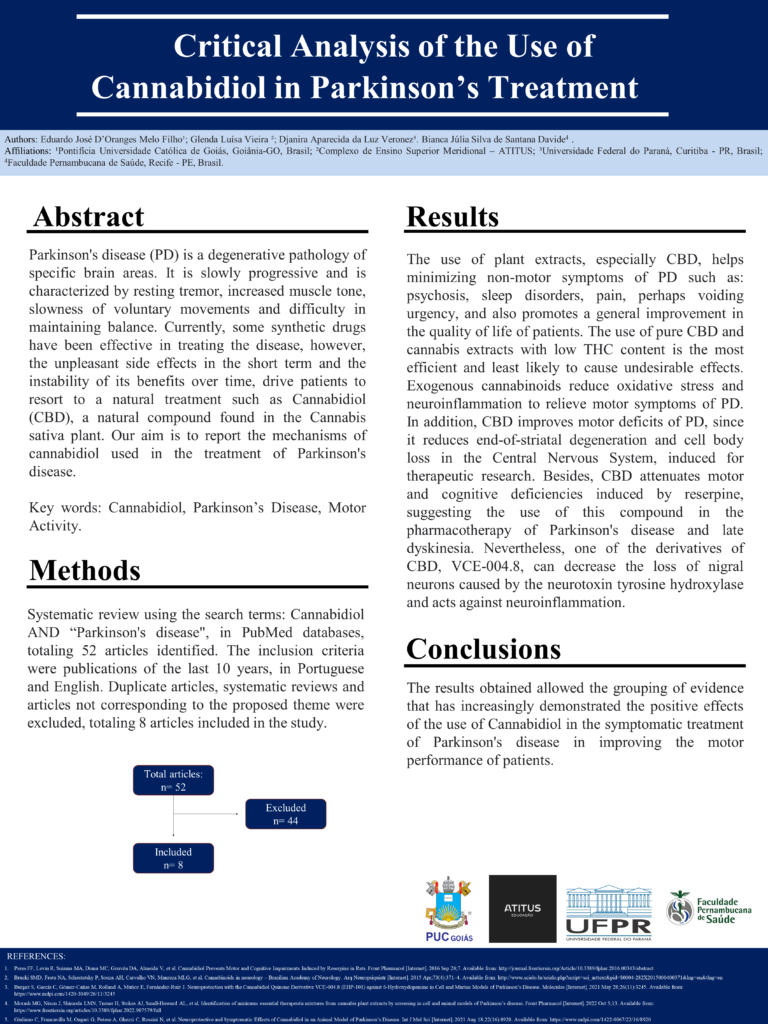Eduardo José D M Filho
Conference 2023 Presentation
Project title
Critical analysis of the use of Cannabidiol in Parkinson’s treatment
Authors and Affiliations
Eduardo José D’Oranges Melo Filho1, Glenda Luísa Vieira2, Djanira Aparecida da Luz Veronez3, Bianca Júlia Silva de Santana Davide4
1. Pontifícia Universidade Católica de Goiás, Goiânia-GO, Brasil
2. Complexo de Ensino Superior Meridional – ATITUS
3. Universidade Federal do Paraná, Curitiba – PR, Brasil
4. Faculdade Pernambucana de Saúde, Recife – PE, Brasil
Abstract
Background
Parkinson’s disease (PD) is a degenerative pathology of specific brain areas. It is slowly progressive and is characterized by resting tremor, increased muscle tone, slowness of voluntary movements and difficulty in maintaining balance. Currently, some synthetic drugs have been effective in treating the disease, however, the unpleasant side effects in the short term and the instability of its benefits over time, drive patients to resort to a natural treatment such as Cannabidiol (CBD), a natural compound found in the Cannabis sativa plant. Our aim is to report the mechanisms of cannabidiol used in the treatment of Parkinson’s disease.
Methods
Systematic review using the search terms: Cannabidiol AND “parkinson’s disease”, in pubmed databases, totaling 52 articles identified. The inclusion criteria were publications of the last 10 years, in Portuguese and English. Duplicate articles, systematic reviews and articles not corresponding to the proposed theme were excluded, totaling 8 articles included in the study.
Results
The use of plant extracts, especially CBD, helps minimizing non-motor symptoms of PD such as: psychosis, sleep disorders, pain, perhaps voiding urgency, and also promotes a general improvement in the quality of life of patients. The use of pure CBD and cannabis extracts with low THC content is the most efficient and least likely to cause undesirable effects. Exogenous cannabinoids reduce oxidative stress and neuroinflammation to relieve motor symptoms of PD. In addition, CBD improves motor deficits of PD, since it reduces end-of-striatal degeneration and cell body loss in the Central Nervous System, induced for therapeutic research. Besides, CBD attenuates motor and cognitive deficiencies induced by reserpine, suggesting the use of this compound in the pharmacotherapy of Parkinson’s disease and late dyskinesia. Nevertheless, one of the derivatives of CBD, VCE-004.8, can decrease the loss of nigral neurons caused by the neurotoxin tyrosine hydroxylase and acts against neuroinflammation.
Conclusions
The results obtained allowed the grouping of evidence that has increasingly demonstrated the positive effects of the use of Cannabidiol in the symptomatic treatment of Parkinson’s disease in improving the motor performance of patients.

